After the last BookNotes on questions about masculinity and how culture — both the left and the right, among others— often misinterprets/distorts Biblical visions of human personhood, dignity, and gender roles, I got to thinking about how when I was growing up in faith, we who favored a Christian sort of feminism (inspired in the 1970s by organizations like the Evangelical Women’s Caucus) had much work to do to convince brothers and sisters that fair representation in various fields and arenas was a matter of Biblical justice. Many of the young Christians I knew were not much interested in public justice, let alone feminist questions.
It may have been Mary Stewart Van Leeuwen who was the first Biblically-grounded person I read or heard, in Gender and Grace: Love, Work & Parenting in a Changing World, to describe the cultural mandate (the first command given to Adam and Eve) in ways that were not gender-specific, but all-inclusive. That is, what Al Wolters called “the foundational command”of Genesis 1: 26 – 28 about home-making was a call to both Adam and Eve. The part of the mandate about culture-making (and ecological care for creation, particularly if you take the Genesis 2 rendering) was a call to both Adam and Eve. Whoever began to say that men were to enter the world of society and the marketplace to “work” and shape history while women stayed home to “keep house” simply were not being Biblical. It all seems fairly self-evident, now (despite the strikingly odd growth of viciously retro and unbiblical groups like the Gothard’s IBLP described in the Netflix doc “Happy Shiny People” or the “Quiverfull” and Babywise near-cults.)
I don’t know the stats but I suspect there is much more gender equality in the sciences, now, than there was a few decades ago; I’ve met a lot of great young collegiate science majors who are women. And in environmental sciences, too (just think of the popularity of the 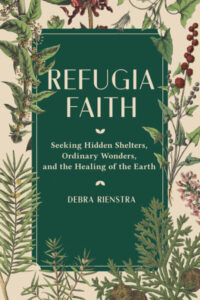
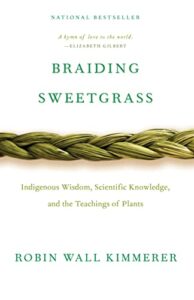 evangelical climate scientist, Katherine Hayhoe, say, and the remarkably beautiful Refugia Faith: Seeking Hidden Shelters, Ordinary Wonders, and the Healing of the Earth by Debra Rienstra, a must-read in my view.) Nature writers include many, many women like Terry Tempest Williams and Annie Dillard and Kathleen Dean Moore (and so many more.) At BookNotes in the last year we’ve promoted the lovely, well-written book Turning of Days: Lessons from Nature, Season and Spirit by Hannah Anderson (published by Moody Press) and I trust that many know the powerful, serious writer Robin Wall Kimmerer, author of the best-selling phenomenon, Braiding Sweetgrass: Indigenous Wisdom , Scientific Knowledge and the Teachings of Plants. These proudly stand alongside classic male nature and natural history writers from Robert MacFarlane to Barry Lopez to J. Drew Lanham, who wrote the nearly luminous The Home Place: Memoirs of a Colored Man’s Love Affair with Nature.
evangelical climate scientist, Katherine Hayhoe, say, and the remarkably beautiful Refugia Faith: Seeking Hidden Shelters, Ordinary Wonders, and the Healing of the Earth by Debra Rienstra, a must-read in my view.) Nature writers include many, many women like Terry Tempest Williams and Annie Dillard and Kathleen Dean Moore (and so many more.) At BookNotes in the last year we’ve promoted the lovely, well-written book Turning of Days: Lessons from Nature, Season and Spirit by Hannah Anderson (published by Moody Press) and I trust that many know the powerful, serious writer Robin Wall Kimmerer, author of the best-selling phenomenon, Braiding Sweetgrass: Indigenous Wisdom , Scientific Knowledge and the Teachings of Plants. These proudly stand alongside classic male nature and natural history writers from Robert MacFarlane to Barry Lopez to J. Drew Lanham, who wrote the nearly luminous The Home Place: Memoirs of a Colored Man’s Love Affair with Nature.
There are deep and provocative books that make connections, such as the stunning Ecowomanism: African American Women and Earth-Honoring Faiths by Melanie Harris (Orbis; $31.00.) I was at an Earth Day event this Spring and a panelist there (a pastor whose church plant is guided by eco-theology) said it was one of the most important books he has ever read!
I thought I’d list a bunch of books by women and men on somewhat connected themes of creation care and science and hiking and nature appreciation, etc. These are all quite new and we are pleased to introduce you to them. They are stacked up in our Dallastown shop in these already packed-to-overflowing sections. I hope you help us out with this space crisis and buy some!! I’ll be somewhat brief so you can get right to it.
BOOKS CAN BE ORDERED BY CLICKING THE LINK AT THE END OF THE COLUMN. From there you can click either “inquire” or “order” from our secure website order page. We’ll be in touch to reply.
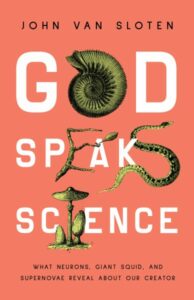 God Speaks Science: What Neurons, Giant Squid, and Supernovae Reveal About Our Creator John Van Sloten (Moody Press) $15.99 OUR SALE PRICE = $12.79
God Speaks Science: What Neurons, Giant Squid, and Supernovae Reveal About Our Creator John Van Sloten (Moody Press) $15.99 OUR SALE PRICE = $12.79
This is, without a doubt, one of my favorite books in recent months, a great read, a true inspiration, and (honestly) a blast. I don’t read that much popular science let alone serious science (except, I’ll admit, some frightening data on long-Covid and research on the dangers in the wastewater) and while I deeply value the “faith and science” conversation — which are exceptionally important, and I hope your church offers some good space for dialogue on the topic — I am not captured with delight by that many titles in the vast field. Enter my pal John Van Sloten, a pastor and a heck of a writer. The back cover promises that it is “a joy-filled expedition into experiencing God’s majestic, everywhere presence.” God Speaks Science is just what we need.
You may recall his unique book on work called Every Job a Parable: What Walmart Greeters, Nurses, and Astronauts Tell Us about God. In a sense, this new book is like that one: he interviews a variety of (in this case) scientists (women and men, I might add) who describe their work in great one-page side-bars. From their testimony of the particularities of their work —in the fields of DNA repair, forest ecology, oncology, chemistry, neuroscience, geoscience, and such — he develops insights and preaching points, making this nearly a handbook for deep spiritual formation. He is developing not only a great creation-based foundation for the doing of faithful scholarly work in research and science education but he is going a bit deeper; he is finding God there in that work, underscoring the beauty of finding our creator so very near everything from alpha-particles to deep-sea life. “Knees and trees. Songbirds and supernovae.”
To prove his point elevating this missional vision of the role of scientists in God’s work in the world, he offers what he calls — get this – Lectio Scientia exercises, helping us encounter God by pondering the details of various aspects of creational reality. As a few of them are explained with prompts, “Moving from knowing to knowing” and “Making matter matter more” and ‘Increasing your providential awareness.” These nine chapters are rich and interesting, both wildly informative and deeply spiritual. Can we “engage God through all good things?” Is there a “spiritual discipline of scientific knowing?”
Van Sten draws on all the great sources to inform his worldviewish work on this, from Gordon Spkyman’s Reformational Theology to Jurgen Moltmann’s Creator Spirit to John Polkinghorne, the Anglican priest with several degrees in the hard sciences. He pushes Brueggemann’s phrase about a “prophetic imagination” in generative, new ways. He knows his stuff, but writes with a nice touch, insightfully citing interesting Bible verses and ancient theologians alongside science journals and stories of his own friendship with working scientists.
This book is a winner, not academic or dense. It is designed nicely. I suspect you know somebody who would love it. Pass it on!
Theologians have long described Scripture and nature as two books of God’s revelation; now Pastor John Van Sloten digs deep into this truth. He actively reads the two books together, with ‘the Bible shining light on creation and creation bringing deeper understanding to the Scriptures.’ John introduces fascinating examples from many fields of science and medicine and draws thought-provoking parallels to theological truths. He invites us to engage with more than our reason–to ponder God’s creation in our hearts and turn in worship to the Author of it all. — Deb Haarsma, astrophysicist and President of BioLogos
I’ve met some fine scientists who are decent theologians, but there are precious few theologians who are as comfortable with the world of science as John Van Sloten. And if you think Van Sloten’s approach is to simply see the hand of God at work in the natural world, then you’ve seriously underestimated the insight of this ‘rational mystic.’ Rather, Van Sloten looks much deeper and finds nothing less than God Himself within the very center of scientific inquiry, from ecosystems to atomic forces and everything in between. This work challenges the scientist to experience God’s manifest presence in the ‘doing’ of science and opens the eyes of the theologian to be able to read God’s “other” book–the natural world and its holy complexity. — Gregory A. Kline, MD, Clinical Professor of Medicine/Endocrinology, University of Calgary
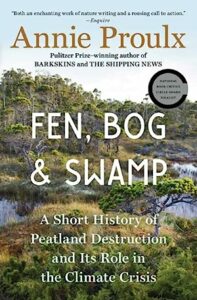 Fen, Bog & Swamp: A Short History of Peatland Destruction and Its Role in the Climate Crisis Annie Proulx (Scribner) $17.99 OUR SALE PRICE = $14.39
Fen, Bog & Swamp: A Short History of Peatland Destruction and Its Role in the Climate Crisis Annie Proulx (Scribner) $17.99 OUR SALE PRICE = $14.39
**Please note: we still have a hardback or two, as well, for 20% off $27.99 (OUR SALE PRICE = $22.39) if you’d rather. Let us know, while supplies last..
Annie Proulx is the sort of writer that one critic called “an irreplaceable American voice.” Born in 1935 she has become an enduring figure in the literary landscape, having been nominated for various awards and having won the Pulitzer Prize. You may know her from Barkskins, The Shipping News, or the short story Broke-Back Mountain.
Proulx is lesser known for her non-fiction but here she has worked her way through often bog-like scholarly literature on the difference between fens and bogs and swamps (you will never confuse them, or casually use the word “marsh”, for that matter, ever again) to make it accessible for us ordinary readers. Indeed, it is interesting and at times fully charming. Besides the natural history of these vital pieces of our literal landscape and other marine estuaries she tells of their current importance and glory and how they are being destroyed. It is a bigger story, in a way, similar to the way that wetlands are under threat, dredged and drained and polluted. This is critical stuff and she makes it fascinating and vital.
And the role these murky, peaty places place in fighting a warming planet. Wow, who knew?
Don’t believe me? Check out these fabulous comments:
An enchanting history of our wetlands… Imbued with the same reverence for nature as Proulx’s fiction, Fen, Bog, and Swamp is both an enchanting work of nature writing and a rousing call to action. — Adrienne Westenfeld, Esquire
Proulx’s astute and impassioned examinations of all kinds of wetlands, including estuaries, show a new side of the novelist we thought we knew. — Bethanne Patrick, Los Angeles Times
A fierce declaration of peat’s importance to climate stability and human survival. Proulx does not imagine she can plug the holes in the peatlands, but she is determined to plug the peatland-size hole in our histories. —The New York Review of Books
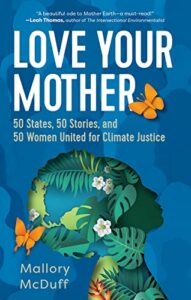 Love Your Mother: 50 States, 50 Stories, and 50 Women United for Climate Justice Mallory McDuff (Broadleaf) $26.99 OUR SALE PRICE = $21.59
Love Your Mother: 50 States, 50 Stories, and 50 Women United for Climate Justice Mallory McDuff (Broadleaf) $26.99 OUR SALE PRICE = $21.59
To describe this well I’d have to summarize all fifty women — activists, scientists, writers, students, farmers and lots more — who are leading in varied ways to achieve climate justice. One woman is listed for each state and that itself is fun; they are grouped by geographic region. It describes each woman, explains her role in local organizing or bearing witness in her particular state, and offers examples of their many struggles and successes. The bios are short, but captivating. There are women of many races and ethnic backgrounds, different faiths, and styles of living into their sense of urgency around ecological care. It is, as one reviewer put it, “a mighty collection, a great read for anyone who cares deeply to care about Earth and community.” And it shows a lot of different ways to do that.
Women have always been involved in this work. As Bill McKibben says, praising these remarkable testimonies, “if we have a fighting chance of coming through these decades, it’s because of them.” Once you start reading, it will be hard to stop, believe me. What a great handbook of inspiration and hope.
Through vivid, thoughtful storytelling, McDuff’s profiles emphasize a timely truth: climate leadership isn’t a monolith. Matriarchs, farmers, writers, rebels, scientists, doctors, innovators, influencers, teachers–all of us, in short–have a home in this movement, if we choose to seek it. — Georgia Wright, co-creator of the podcast Inherited
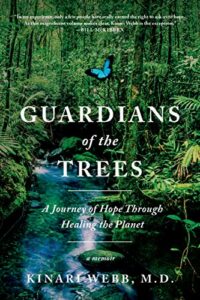 Guardians of the Trees: A Journey of Hope Through Healing the Planet Kinari Webb, MD (Flatiron Books) $18.99 OUR SALE PRICE = $15.19
Guardians of the Trees: A Journey of Hope Through Healing the Planet Kinari Webb, MD (Flatiron Books) $18.99 OUR SALE PRICE = $15.19
This isn’t brand new, although the paperback edition is fairly recent. I just discovered this gem thanks to it being a reading club book among our new friends up at Bayview in Petoskey, MI. (Did you see my sermon on Colossians 1 and the significance of curiosity and reading that I shared in a previous BookNotes, delivered there?) Since the Bayview community is reading this together I naturally picked it up. And what a book! What a wild and thrilling book!
The story isn’t told linearly but it unfolds artfully and with amazing reporting of this woman’s extraordinary work. She and the man who is now her husband have started a series of clinics for indigenous people on several of the islands in Borneo. He is a science researcher and through her med school (Yale) and his post-doc work (Harvard), they ended up returning to this place they served in college, awestruck by the beauty of these rural islands in the south Pacific. Not only, though, were they struck by the land and sea and by the communal processes and goodness of the local people but they were heartbroken by the rainforest destruction they witnessed. It was bad.
The clinics they offered invited folks to free or low cost care if they’d get out of the logging business. Many worked for rapacious corporations in dangerous logging or burning jobs in order to earn enough to pay for expensive health care. It seemed like a win-win, although it is not easy coming up against the powers of greed and technology and progress. Yet, she understood the bigger-picture ecological importance of saving the ecology of this incredible land and worked with the locals to find innovative solutions to their own health care needs and getting away from the gross destructive work ruining their own homelands. A lot goes down in the process.
There is a chapter when she goes to help offer medical assistance among the large international teams that were first responders to the devastation of the massive tsunami on Christmas Day of 2005. Date-lined Sukudana in West Kalimantan, she was astonished to see how little “radical listening” (as she practiced it in her own work) the big agencies attempted, even as each jostled for control of the relief efforts. Sigh…
In a terrifyingly riveting chapter she almost died from a rare box jellyfish sting which caused her to return to the States and spend four full years fighting for her life. The crisis, and some marital anguish, precipitated her rethinking everything — including her serious religious agnosticism.
Dr. Kinari, as the indigenous people call her in Borneo, is now still at it, working on several global projects fighting climate change and she is doing extraordinary medical care in a manner that thoughtful Christian medical missionaries do. She is expanding her work from local to a more global scale. She has told parts of her story all her the world and is friends with luminaries like Dr Jane Goodall. This is a book that is hard to put down as you follow this courageous, relentless woman on her journey to make a big difference. Her chapter on hope is hard-earned and well worth reading.
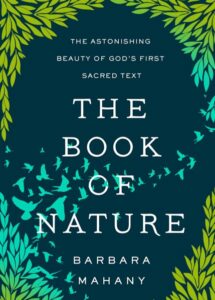 The Book of Nature: The Astonishing Beauty of God’s First Sacred Text Barbara Mahany (Broadleaf Books) $27.99 OUR SALE PRICE = $22.39
The Book of Nature: The Astonishing Beauty of God’s First Sacred Text Barbara Mahany (Broadleaf Books) $27.99 OUR SALE PRICE = $22.39
This is a wonderful book, beautifully written, thoughtful, literary, and capacious in a generous sort of faith. She notes that we “live within a nautilus of prayer — if only we would open our senses and perceive what is infused all around.”
Listen to this description by Scott Weidensaul, author of World on the Wing. He writes:
Barbara Mahany’s The Book of Nature is a deeply rich celebration of the ageless overlap between religion and the many faces of the natural world — the ‘Book of Nature’ to which mystics, monks, and others have turned for insight into the sacred. Best of all, this thought-provoking exploration is wrapped in Mahany’s luscious and luminous writing, which makes every page a delight.
We’ve appreciated Barbara Mahany’s good prose and gracious spirituality in other books she has written; perhaps you know her popular and beautiful Motherprayer, released by Abingdon Press a few years back. In 2014 she did a lovely book called Slowing Time: Seeing the Sacred Outside Your Kitchen Door which hinted at her love of nature and her wisdom about the spirituality of the ordinary. Nearly twenty years later she has deepened this passion and learned so much which she gently shares in this new one.
The Book of Nature, though, is richer and deeper and perhaps more broad theologically than her previous ones. There are rave blurbs on the back by the poet Padraig O’Tuama and Rabbi Rami Shapiro. Bill McKibben says it offers “lovely and smart reflections. — the perfect book to slip into a rucksack on a day you’re planning a wander through the larger world.”
You can get a glimpse of the literary style by noting the section titles. There are several chapters in each, starting with The Earthly (including ruminations on Garden, Woods, Water’s edge, and Earth’s turning), The Liminal (including Birds, Gentle Rain, Thrashing Storm, First Snow) and what she calls The Heavenly (with chapters called Dawn, Dusk, Stars, and Moon.) After each there is a “litany of astonishments.” Just beautiful.
There is a great bit of introductory stuff, and a beautifully done “bookshelf of wonder” at the end which you’ll have to take with you to the library the next time you’ve got a good while to browse. It is a spectacularly annotated bibliography of books that have moved her, explaining why she likes each one.
Mahany ends with a long epilogue simply called “Lamentations for the Book of Nature” that starts with the famous line by Wendell Berry saying, “There are no unsacred places; there are only sacred places and desecrated places.” This is a moving, beautiful book.
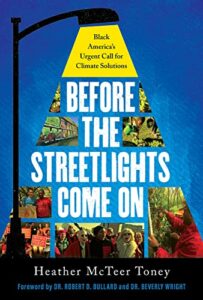 Before the Streetlights Come On: Black America’s Urgent Call for Climate Solutions Heather McTeer Toney (Broadleaf) $24.99 OUR SALE PRICE = $19.99
Before the Streetlights Come On: Black America’s Urgent Call for Climate Solutions Heather McTeer Toney (Broadleaf) $24.99 OUR SALE PRICE = $19.99
Oh my, what a book, important, beautiful, rare. It is urgent on many levels and we are honored to carry it. We featured it at a Climate Change Summit earlier in the year and a few folks were glad to see it. I’ve been wanting to tell you about it here.
The short version is simple, even if the topic is complex and painful: neighborhoods mostly inhabited by people of color have been the recipients of a racist sort of environmental abuse for years and there is, like the facts about redlining, say, no doubt about our need for some kind of reckoning about this vile legacy. (It is, as David Axelrod put it, “a shameful history.”) Poor neighborhoods are grounds for (often illegal) toxic dumping, lax enforcement of pollution regulations, defaced standards of water and air quality and more. This large call to name the sins of environmental racism is some of the backstory of this book, but — to be clear — it is not mostly or only about that. It is, rather, a practical and accessible book to guide us towards climate action in and for and with marginalized communities. It invites the broader environmental movement to be aware of the need for multicultural leadership, inviting readers who come from such communities to get fired up.
(Did you know, by the way, that Latino/a and black citizens are the most likely to express concern about climate change? Statistic after statistic in recent years have indicated that, challenging the old image of white hippies and tree huggers. For every Greta Thunberg or Bill McKibben there is a Heather McTeer Toney or Mustafa Santiago Ali, of the National Wildlife Association.)
Tamara Toles O’Loughlin is a black national climate strategist and founder of Climate Critical Earth. She says, “Now is a time for deeper and more diverse public thought about climate and environment. Heather McTeer Toney is taking up the challenge” And so should we all, at least by learning what this book has to offer. It will be valuable for you, I’m sure.
Climate change affects all of us, but it doesn’t affect us equally. All too often, those most affected are already overwhelmed by the cascading impacts of inequity and injustice. Drawing from her vivid life experiences and wealth of knowledge, Heather McTeer Toney sounds a clarion call for immediate climate action in and for marginalized communities. Why? Because if we don’t fix climate change, we can’t fix anything else. — Dr. Katharine Hayhoe, climate scientist and author of Saving Us: A Climate Scientist’s Case for Hope and Healing in a Divided World
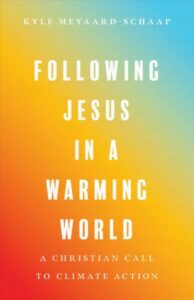 Following Jesus in a Warming World: A Christian Call to Climate Action Kyle Meyaard-Schaap (IVP) $18.00 OUR SALE PRICE = $14.40
Following Jesus in a Warming World: A Christian Call to Climate Action Kyle Meyaard-Schaap (IVP) $18.00 OUR SALE PRICE = $14.40
When I look at our many, many faith-based books on ecological care and highlight my favorites, particularly those of evangelical orientation and serious Biblical fidelity, there are plenty. Some of the best books on creation care these past decades have been by thoughtful evangelicals — they are inspiring, Biblically-based, clear-headed and persuasive. This short, recent one is among the best. I’ve mentioned it here before but can hardly say enough about it.
One of the cool features of Following Jesus in a Warming World is that it emerged from Meyaard-Schaap’s work as a leader in the national movement of Young Evangelicals for Climate Action. (He has spoken on CNN, PBS, NPR, NBC News, and written for U.S. News and World Report.) That organization, created largely of younger evangelical folks, made significant headway in helping [some of] the mainstream media learn that much of evangelicalism is a different faith thing than the right-wing fundamentalism that idolizes Trump and is taken with the odd values of the Q-Anon and MAGA movement. The Young Evangelicals for Climate Action, are largely nonpartisan, trying to honor Jesus and are eager to get stuff done by adhering to faithful civic principles. They worked hard to focus those who were apathetic or cynical towards real activism, especially among religious youth.
Meyaard-Schaap now is the Vice President of the respected Evangelical Environmental Network and in this book he brings us up to date on the latest Biblical and theological reflections on the vocation of creation care and, through stories from the field, tells of how to discover real hope and meaningful action. In fact, he thinks that story-shaping is part of our best calling, since humans live by stories. (Remember Nourishing Narratives by Jennifer Holberg that I reviewed a while back? Or the profound You Are What You Love by Jamie Smith? I gather he digs this kind of stuff. Plus, he cites the fabulous Stephen Bouma-Prediger’s Earthkeeping and Character: Exploring a Christian Ecological Virtue Ethic.) I’m a fan.
Kyle notes, clearly, that we need not be guided by a sense of guilt or drudgery but by the joy of a discipleship that includes caring for creation. There’s a story there. I highly recommend it.
This is a marvelously engaging book about overwhelmingly urgent matters. Kyle Meyaard-Schaap is convinced that we are formed by stories in how we understand reality, and he urges us to approach climate change action in the light of the gospel’s Big Story. I pray that many will be moved to climate advocacy by the compelling personal stories that Meyaard-Schaap tells in making his case. — Richard Mouw, senior research fellow at Calvin University’s Henry Institute for the Study of Religion and Politics, author of How to Be a Patriotic Christian: Love of Country as Love of Neighbor
While fellow Christians remain apathetic or dismissive, Christians concerned about the climate crisis can feel they are walking a lonely journey. For these lonely journeyers, Kyle Meyaard-Schaap is a patient, trustworthy, experienced encourager. His irresistible passion calls us back from deceptive narratives into the real story of God’s redemptive love for all creation. This book is a deeply scriptural call to advocacy for people and planet as both moral necessity and spiritual discipline. What a gift! Finally, Christians can take courage and hand this book to others, saying, ‘This. Read this.’ — Debra Rienstra, professor of English at Calvin University and author of Refugia Faith: Seeking Hidden Shelters, Ordinary Wonders, and the Healing of the Earth
Christians can take courage and hand this book to others, saying, ‘This. Read this.’ — Debra Rienstra
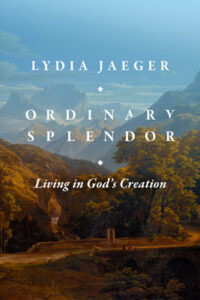 Ordinary Splendor: Living in God’s Creation Lydia Jaeger (Lexham Press) $18.99 OUR SALE PRICE = $15.19
Ordinary Splendor: Living in God’s Creation Lydia Jaeger (Lexham Press) $18.99 OUR SALE PRICE = $15.19
I suppose for those longing for the luminous prose of the likes of Barbara Mahany, this may seem a bit, well, prosaic. It is not nearly as charming as it might be but what it misses in loveliness it makes up in excellent theological integrity and Biblical brilliance. In this sense, this is a truly excellent book and one we are happy to recommend.
Lydia Jaeger received her PhD from the Sorbonne, the world famous university in France. She is now the academic dean at Cogent Bible Institute (also in France) and has written academic works, one, for instance, relating Einstein and Michael Polanyi. Okay, then.
An academic work that preceded this one was on the faith and science discussions, entitled What the Heavens Declare: Science in Light of Creation (Cascade; $29.00) which was a detailed analysis of a theistic approach to the scientific task.
Here is how that one is described:
“As the author explains, despite the common use of the expression “laws of nature” by both scientists and laymen, there is a long-standing tradition of philosophical debate about, and even refusal of, the notion that laws of nature might exist independently of a divine or human mind. This work attempts to account for natural order in harmony with the religious worldview that significantly contributed to the original context in which modern science began: the world seen as the creation of the triune God.”
As you can see from that description of her previous project she is a Biblically-influenced, serious-minded philosopher; she presents the doctrine of creation “in all its practical necessity.”
In this new one, Ordinary Splendor, she “unfolds the majesty of God’s creative work and explores how it shapes and informs everything — from our relationships and the way we pray to how we think about human dignity.”
There is a solid array of Biblical creation passages that provide wisdom for our daily lives, so I suppose this is not exactly about the beauty of the Earth or even about caring for creation. But it is an exceptional bit of useful scholarship reminding us of the implications that we live in a created world. Ordinary Splendor: Living in God’s Creation by Lydia Jaeger is going to be very helpful for those sorting through the Scriptures and looking for a foundation for living in the world God so loves.
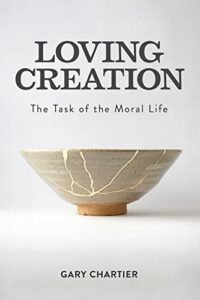 Loving Creation: The Task of the Moral Life Gary Chartier (Fortress Press) $39.00 OUR SALE PRICE = $31.20
Loving Creation: The Task of the Moral Life Gary Chartier (Fortress Press) $39.00 OUR SALE PRICE = $31.20
If the poetic and passionate writers colorfully tell us of their love for nature, and the orderly scholar, like professor Jaeger, carefully tells us of the Scripture’s consistent proclamation of the notion that the cosmos is made and upheld by the Triune God, then, what? Loving Creation by Dr. Gary Chartier (who is also a legal scholar and teacher of business ethics) is a serious, modern, theological voice attempting to answer that in the cadences of love. It is a “theological ethic rooted in love and focused on flourishing.”
I have not read this yet but it looks mature, serious-minded, a bona-fide theological project. Yet, it is said to be a tour de amour in ethics. Theologian and thinker Thomas Jay Oord says of it, that “by taking creation — not just humans or God — as the focus,” Loving Creation “offers an appealing exploration of well-being in our time. Highly recommended.”
This study assumes the centrality of being alive in God’s cosmos but it is not only about care for creation or concern about climate change, pollution and such. Rather, it probes topics as diverse as war and peace and sexuality and church conflict. My, my. As the renowned Boston College scholar Lisa Sowle Cahill puts it, it is “comprehensive and fair-minded” and a “wonderful springboard for theological discussion and learning!”
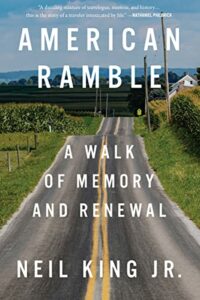 American Ramble: A Walk of Memory and Renewal Neil King, Jr. (Mariner) $32.50 OUR SALE PRICE = $26.00
American Ramble: A Walk of Memory and Renewal Neil King, Jr. (Mariner) $32.50 OUR SALE PRICE = $26.00
While this isn’t primarily a hiking book designed to take us into the beauty of the wild, it is a beautifully-written work — what brilliant documentarian Ken Burns has called “a near-perfect book” — and has some lovely nature scenes. The author is deeply aware of the mysteries of the universe that surround him as he travels and he meets several overtly Christian groups and people along the way. One tells him of the importance of Romans 12:1 and some Mennonite high schoolers sing hymns for him.
Ken Burns, again, puts it well:
It’s not just a geographical journey, full of keen observations and thoughtful insights, but also a spiritual one, finding in our complex and sometimes contradictory landscape a mirror in which King’s own inner life awakens as he wanders. Amazing.
Here is what is also really interesting about this volume (that surely deserves a longer review in another BookNotes): by walking the 330 mile trek from Washington DC to New York City, King comes through our area, crossing over the Mason Dixon Line just south of us here in Dallastown, hanging out in Hanover Junction (where Lincoln famously stopped on his way to deliver the Gettysburg Address, and where his funeral train passed through a bit more than a year later.) King spends a day in York, meeting some friends of ours (including the extraordinary former newspaperman and now local historian and churchman, Jim McLure) as he explains much about the important history of York. King makes his way across the Susquehanna River and is notably moved; it’s a very cool portion, an important passage for him and, he notes, very significant in the imagination of early American history. Indeed, the Susquehanna — perhaps one of the very oldest rivers in the world — is more important than some know. Anyway, it’s a great read for anyone, but certainly for those of us in central PA.
He moves across the river and comes to meet Mennonite folk in Lancaster County. Hang on; sooner enough he is in a rare building near Philly doing some extraordinary night-sky gazing with Quakers. What a story.
One reviewer notes that it is a “beguiling journey of forgotten history and unsuspected delights.” (One of the unsuspected delights, it seems, is King’s appreciation of ordinary, rural Americans who are almost (almost!) endlessly helpful. Experiences of common ground seem almost viable while reading his stories and it gives me some down-to-Earth hope.) It is interesting how helpful people are, including those who heard there was some guy walking to New York; not only do people want help in simple ways, some want to talk .And talk they do.
Louis Bayard, who wrote Jackie and Me and The Pale Blue Eye says that King “takes his place in a distinguished travelogue lineage stretching back to Thoreau but, from the start, manages to stake out his own hard-won terrain.” That is, he has some sort of an agenda, here, glorying in olden ways, discovering something about our land, our people, our heritage.
American Ramble is a warm-hearted story and loaded with lots of colorful folk. It is a different story than one I reviewed here a month or more ago, Where the Waves Turn Back: A Forty-Day Pilgrimage Along the California Coast by singer-songwriter Tyson Motsenbocker ($27.00 – OUR SALE PRICE = $21.60) but it bears reminding you of that terrific, haunting book. Tyson is younger, struggling with questions of evangelical faith, the death of his mother, and, importantly, is hiking not on the East Coast, like King is — encountering Washington’s Crossing, for instance — but is on the West Coast, trekking the old “El Camino Real,” a 600-mile pilgrimage route up the California coast. I loved that book a lot; I love that guy. As Tyson moves towers the towering cliffs of Big Sur and up to San Francisco he connects with artists and songwriters and hobos and fellow California hikers, each shaping a bit of his own journey towards deeper self discovery.
Neil King is an older gentleman, coping with a life-threatening cancer diagnosis and some serious Covid symptoms, and is longing to find a better America, learning about colonial era stuff. He’s walking through Pennsylvania rural land and into north Jersey, eventually finding “rapture on the Bayonne bridge” into New York. Tyson grew ecstatic seeing the Golden Gate Bridge, naturally; it’s fun to compare the two hikers and writers, one a singer-songwriter, the other a former cabbie and world-class journalist.
As Mr. King puts it, the journey started as a whim and soon became an obsession. Neil King, Jr. is a very gifted writer who helped the Wall Street Journal win a Pulitzer Prize for its 9-11 coverage; he has a reporter’s style of being unafraid to snoop around and get the local scoop. Besides some lovely nature writing and fascinating hiking stuff, he does, indeed, get the scoop. It makes for a wonderful read and a very enchanting book. Enjoy!
+++
TO PLACE AN ORDER
PLEASE READ, THEN SCROLL DOWN AND CLICK ON THE “ORDER HERE” LINK BELOW.
It is very helpful if you tell us how you prefer us to ship your orders.
The weight and destination of your package varies but you can use this as a quick, general guide:
There are generally two kinds of US Mail options (who just raised their rates again) and, of course, UPS. If necessary, we can do overnight and other expedited methods, too. Just ask.
- United States Postal Service has the option called “Media Mail” which is cheapest but can be a little slower. For one typical book, usually, it’s about $4.12; 2 lbs would be $4.87.
- United States Postal Service has another option called “Priority Mail” which is $8.50, if it fits in a flat-rate envelope. Many children’s books and some Bibles are oversized so that might take the next size up which is $9.20. “Priority Mail” gets much more attention than does “Media Mail” and is often just a few days to anywhere in the US.
- UPS Ground is reliable but varies by weight and distance and may take longer than USPS. We’re happy to figure out your options for you once we know what you want.
If you just want to say “cheapest” that is fine. If you are eager and don’t want the slowest method, do say so. It really helps us serve you well so let us know. Just saying “US Mail” isn’t helpful because there are those two methods, one cheaper but slower, one more costly but quicker. Which do you prefer?
BookNotes
SPECIAL
DISCOUNT
20% OFF
ALL BOOKS MENTIONED
+++
order here
this takes you to the secure Hearts & Minds order form page
just tell us what you want to order
inquire here
if you have questions or need more information
just ask us what you want to know
Hearts & Minds 234 East Main Street Dallastown PA 17313
read@heartsandmindsbooks.com
717-246-3333
Sadly, as of July 2023 we are still closed for in-store browsing. COVID is not fully over. Since few are reporting their illnesses anymore, it is tricky to know the reality but the best measurement is to check the waste water tables to see the amount of virus in the eco-system. It is bad; worse than it was two years ago, even. It’s important to be aware of how risks we take might effect the public good as those at risk, while not dying from the virus, are experiencing long-term health consequences. (Just check the latest reports of the rise of heart attacks and diabetes among younger adults, caused by Covid.) It is complicated, but we are still closed for in-store browsing due to our commitment to public health (and the safety of our family, staff, and customers.) The vaccination rate here in York County is sadly lower than average. Our store is a bit cramped without top-notch ventilation, so we are trying to be wise.
We will keep you posted about our future plans… we are eager, but delayed, for now.
We are doing our famous curb-side and back yard customer service and can show any number of items to you if you call us from our back parking lot. It’s sort of fun, actually. We are eager to serve and grateful for your patience as we all work to mitigate the pandemic. We are very happy to help, so if you are in the area, do stop by. We love to see old friends and new customers.
Of course, we’re happy to ship books anywhere.
We are here 10:00 – 6:00 EST / Monday – Saturday. Closed on Sunday.

